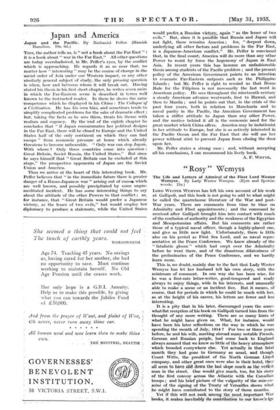Japan and Ameri&a.
Trim, the author tells us, is " not a book about the Far East "-; it is a book about " war in the Far East." All other questions are today overshadowed, in Mr. Peffer's eyes, by the conflict -which is approaching. He regards it as so near that, no matter how " interesting " may be the course of change in the 'social order of Asia under our Western impact, or any other 'similarly general subject of study, the only pressing question 'is when, how and between whom it will break out. Having 'stated his thesis in his first short chapter, he writes seven more in which the Far-Eastern scene is described in terms well known to the instructed reader. In them he shows the same 'competence which he displayed in his China : The Collapse'of la Civilization. He has his own bias, andiometimes tends to 'idiplify complicated problems for the sake of dramatic effect ; -Nit, taking the facts as he sees them, treats his theme with "realism and cogency. By the end of the eighth chapter lie -concludes that " if Japan consummates her political designs in the Far East, there will be closed to Europe and the United States half of the only continent on which they can find escape " from economic pressure at home which already :threatens to become unbearable. " Only war can stop Japan. With whom ? Only three countries come into question : Great Britain, Soviet Russia, the United States." But since he says himself that " Great Britain can be excluded at this stage," the prospective opponents of Japan are the Soviet Union and America.
Thus we arrive at the heart of this interesting book. Mr. -Peffer believes that " in the immediate future there is greater danger of a Russo-Japanese war " arising out of causes which are well known, and possibly precipitated by some unpre- meditated incident. He has some interesting things to say about the attitude of the other Powers to that conflict ; as, for instance, that "- Great Britain would prefer a Japanese victory, as the lesser of two evils," but would employ her diplomacy to produce a stalemate, while the United States
would prefer., a Russian victory,. again " as the lesser of two evils." But, since it is possible that Russia and Japan will not fight, there remains America ; for, " deepest down, underlying all other factors. and problems in the Far East, is a Japanese-American conflict." Mr. Peffer is convinced that, in the final count; America will do more than any other Power to resist by force the hegemony of Japan in East Asia. In recent years this has become an unfashionable thesis among students of the Pacific problem ; and the present policy of the American Government points- to an intention to evacuate Far-Eastern outposts such as the Philippine Islands ; but Mr. Peffer is right to remind us that Home Rule for the Filipinos is net necessarily the last word in American policy. • He sees throughout the nineteenth century a steady American advance westwards, first to Hawaii, and then to Manila ; and he points out that, in the crisis of the past four years, both in relation to Manchuria and to naval parity in the Pacific, the American Government has taken a stiffer- attitude to Japan than any other Power, and the motive behind it all is the- economic need for the great market which China offers. America may be isolationist in her attitude to Europe, but she is so actively interested in the Pacific Ocean and the Far East that she will use her power without stint to prevent Japan from closing the door upon her.
-Mr. Peffer states a strong case ; and, without accepting all his conclusions, I can recommend his lively book.
A. F. WnyTE.


























































 Previous page
Previous page